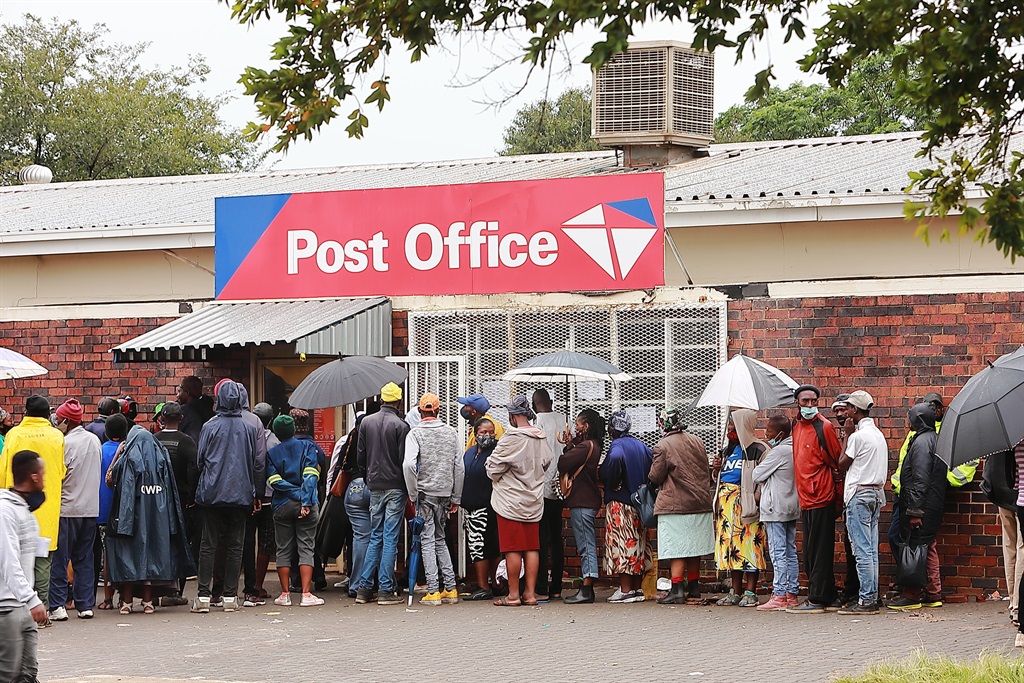
What this "glitch" on the part of our Postbank has shown us, in a very stark manner, is that we simply cannot do without a social welfare system, writes Oscar van Heerden.
I have written extensively on the need for a basic income grant, and my argument is rather rudimentary: if our private sector and government collectively fail to create jobs for our people, then we must use other instruments, such as tax, to put cash in hand of all those deserving citizens.
No amount of arguments is going to make me change my mind on this one. Arguments abound for why we need a social welfare system in South Africa and, indeed, plenty more counterarguments for why we must not have one.
What this "glitch" on the part of our Postbank has shown us, in a very stark manner, is that we simply cannot do without a social welfare system, period.
This debacle has shown me the utter desperate position our people find themselves in. Imagine you are a salaried person having to forfeit two weeks of your salary; its simply unimaginable. The fact that we all live in such debt simply means we live from one paycheck to the other, and yet, there are some of you who want to argue that we must stop the welfare to the most vulnerable in our society.
Not enough
Various interviews on news stations showed us that people are so frustrated with what they are receiving, and that in fact it’s not enough. Food and basic services are desperately needed and a glitch in the system that ensured that millions did not get their monies was a matter of life and death for many.
So whether it is indeed an ICT systems glitch or whether it is because the service provider mandated to make the layouts were not contractually paid for their services is immaterial. This sort of incompetence cannot go unpunished. Let's see if there will indeed be any consequence management on this one. I doubt.
The glitch we are told is because of the IT service provider not being paid, and yet since the start of the problem, we have been fed all sorts of excuses.
READ | Melanie Verwoerd: Grant fumble - When askies is not enough
Our people are the most important element here. The elderly, the children and caregivers need this money, and yet our Treasury wants to play politics.
At this very moment and in the midst of this very crisis, they use fear-mongering about our debt levels and talk of austerity while taking issue with the grant system.
Let me be very clear: in the absence of employment and dignity, the grant system is here to stay. And since this is also an election year, I strongly suggest Treasury rethink its plans of cutting budgets and trimming fat throughout government. It’s a no-brainer that any governing party will oppose such moves in an election year.
According to two leading academics, Kevin Farnsworth and Zoe Irving, there are politics involved in austerity economics.
They go further in stating that: "The 2008 global economic crisis paved the way for the construction of a new, elite-driven, capital-centric, shrunken welfare state project founded on ideology disguised as pragmatism and objective 'truths'. Today, welfare states exist in a context in which a new politics of austerity sets the parameters of the debate."
There is, of course, also a powerful counter-narrative that suggests that the global crisis exposed the fundamental weaknesses and limitations of neoliberalism and forced policymakers to question core principles and change direction. Focus on the International Monetary Fund (IMF), perhaps the pre-eminent global neoliberal interlocutor.
In other words, the policies of neoliberalism, which is what our Treasury has been advocating since 1996, typically support fiscal austerity, deregulation, free trade, privatisation, and a reduction in government spending.
Yet, when we take an intense look at the results of such an approach over the last two decades, we find that very little in the form of job creation, development and growth have been the results. So, at what point do we take a slightly different track because the above position, which Treasury is yet again touting because they are more concerned with international credit ratings and international investor priorities, which has not entirely worked for us.
READ | Mpumemelo Mkhabela: Corruption, incompetence place heavy burden on SA's social welfare system
Neoliberalism is essentially an economic ideology that is narrowly focused and primarily concerned with markets and the policies and measures that influence the economy. Hence, neo-liberalism is what you (Treasury) are advancing, and I don't think we will fall for your pragmatism argument.
I contest that Treasury is too scared or otherwise does not possess the skills to try something different. But as the quote attribited to Einstein has reminded us time and time again, when will Treasury realise that you cannot apply the same solutions to a problem and expect a different outcome?
All your austerity measures will do is kick the debt can further down the road for future Treasury staff and generations to deal with, that’s all.
Alternative plans needed
Inequality is another phenomenon that increased during neoliberal economics, and we have one of the most unequal societies in the world already.
Inequality hinders the long-term growth opportunities of the economy in any country. On the one hand, you have those who earn low or no income and hence have limited spending power, while there are those who become richer and have a propensity to save. This situation will simply continue unless we try something else, perhaps.
Globalisation, on the other hand, is also very much encouraged by the proponents of the neoliberal world order. It refers to the spread of the flow of financial products, goods, technology, information and jobs across national borders and cultures.
In essence, it describes the independence of nations around the globe fostered through free trade. But as we know, an inadvertent consequence of globalisation was that more and more countries became increasingly independent and began to claim their sovereignty away from former colonial powers and, indeed, from the collective West. A collective that has exploited the weaker countries worldwide for their benefit. Thus, the end of globalisation had to happen as we know it.
Nowadays, there's rather talk of decoupling and de-risking from certain countries, so much for free trade among nations and cultures.
This is the broader context within which these policy choices by our Treasury emanate, and the question we must ask is what will work for us domestically. Taking away the social grant system or wanting to keep it at a reduced level is a big no. It won't happen. Come up with alternative plans and fast if I were you; otherwise, it will cost the country dearly.
Don't try to criminalise poverty and inequality. Rather let us think outside the proverbial box for the sake of all our people.
- Dr Oscar van Heerden is a senior research fellow for African Diplomacy and Leadership at the University of Johannesburg.
*Want to respond to the columnist? Send your letter or article to opinions@news24.com with your name and town or province. You are welcome to also send a profile picture. We encourage a diversity of voices and views in our readers' submissions and reserve the right not to publish any and all submissions received.
Disclaimer: News24 encourages freedom of speech and the expression of diverse views. The views of columnists published on News24 are therefore their own and do not necessarily represent the views of News24.




 Publications
Publications
 Partners
Partners























